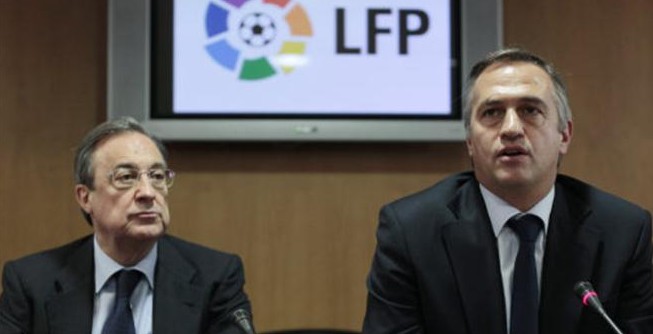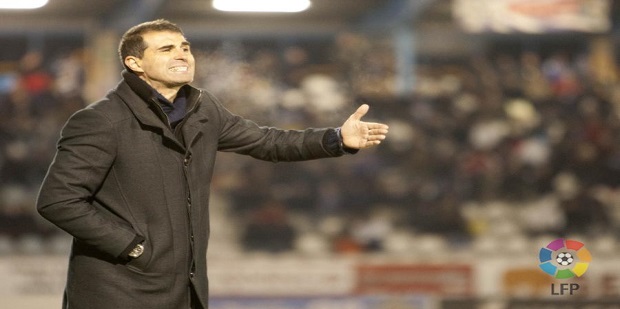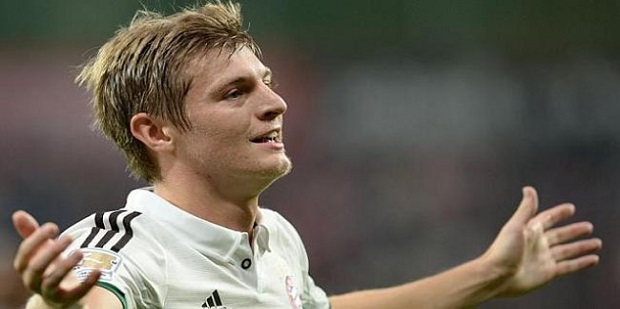- S.D. Eibar ready for maiden La Liga outing
- SD Eibar stengthen ahead of debut La Liga season
- Can ‘Super Mario’ live up to expectations in Madrid?
- MAN IN THE GROUND – Brentford 0 – 4 Osasuna
- Historic Basque derby welcomes S.D. Eibar to La Liga
- Munich to Madrid, via Brazil – Tony Kroos
- Rakitic in Spanish Switch
- Can Spain find redemption in Rio?
- Viva Espana! A season of redemption for Spanish football
- From the old to the new: who can fill the void in years to come for La Roja?
MONEY MATTERS – La Liga’s TV debate rumbles on
- By Alex Bromley
- Updated: 17 October, 2011

By Alex Bromley
There are no two ways of looking at it; Spain is dominated by two football clubs.
Real Madrid and Barcelona, the majority shareholders in La Liga are global phenomena and, despite debts, are in absolutely no danger of going into administration.
The players of the two clubs have their fate in their own hands. They will be safe as houses, so long as they remain at either of these two giants – they will be looked after so long as they keep churning out their impressive results.
However, the same cannot be said for other clubs in the Spanish top tier and subsequently, their players do not have the same safety net as those who wear the coveted shirts of El Galacticos.
For a blatant example of such, see Richard Thornburn’s earlier article about the shirt sponsor farrago (http://www.centrocampista.com/?p=1737).
As a result, and as we all know La Liga’s finest striked and delayed the start of the footballing season for the first time in 27 years earlier this year.
The president of the Spanish Players Association (AFE), a Mr Luis Rubiales, was surrounded by national captain and hero Iker Casillas, and many of the other World Cup winning squad to resolve two issues that had not been resolved throughout the summer.
One may say it was easy for the national squad to protest, as they are amongst the safest of all of the players in the league – the majority of the squad come from the two giants after all.
But why did they strike?
Well there were two basic reasons. Firstly the Spanish League (LFP) were demanded to resolve their debts of around €50 million – not a particularly large amount of money for a football league, but around 200 professional players had been affected by this unsettled debts which still stood.
Secondly, the AFE demanded that a ‘safety account’ was set up by the LFP which essentially stored rainy-day money.
Should any large club be lowered into administration, the AFE would be able to pay the players the wages which were guaranteed to them in their contracts, without having to draw money directly from their parent club.
Rubiales categorically stated: “This is not about getting more money. We don’t want more, we simply want players to get paid what it says in their contracts”.
Now these seem like incredibly simple plans.
One is a paying of a debt; the other is just a good idea, but the LFP are struggling and the rifts within the league are not helping matters either.
The LFP and the TV broadcasters have come into a raft of criticism from the clubs and the fans for what are deemed as ‘unpopular’ kick-off times.
However, it’s a bit of a vicious circle at times in that the broadcasters hold the money, so they pay the LFP, who in turn pay the clubs partly through the broadcasters.
Many moons ago, Spanish football clubs started taking matters into their own hands as each club negotiated deals, but they did so individually which, once again, doesn’t really sort the problems out at all.
The failure to do things collectively has caused huge financial disparity which means the top two took €140 million each, with the next biggest club netting just €42 million.
Granada president Quique Pina called the deals “abysmal”. Just in case you were wondering, his newly promoted team will earn about €13 million from TV rights this season – a mere 9.28% of what Barca and real will get.
Of the 18 remaining clubs in La Liga, 12 signed a petition in November 2010 to decrease the total TV revenue that Real and Barca get from 52% this season down to 36% in the 2015-16 season.
However, being Spain, it doesn’t end there and there are more internal debates.
The six of the 18 sides that did not sign the petition believe they can tackle the problem head on, and in the process make some increased financial gain for themselves.
Sevilla, Zaragoza, Bilbao, Espanyol, Sociedad and Villarreal all want to take matters into their own hands and discuss their own way of doing things – upping their contracts by taking the money off the big two. Now we essentially have four groups; the 12, the six, and Real Madrid and Barcelona.
Having come to their senses in September, the sixand the 12 held an emergency meeting to discuss the problem further. Barcelona and Real were, of course, not invited.
Having previously called La Liga “the biggest load of garbage in Europe” and “a third world league”, Sevilla President Jose Maria Del Nido (who called the meeting) later addressed the media stating: “we will respect the contracts we have signed with the broadcasters”.
Change of heart anyone?, or are the clouds gathering for a two versus 18 debate in the coming season?
For the LFP, the scenario is clear; are they willing to stop the monopoly held by arguably the two biggest clubs in the world, in order to bring some parity to the remainder of the top division in Spain?
This one is sure to rumble on, and it could get messy…
Follow @icentrocampista






You must be logged in to post a comment Login